The Potential of AGI: How Artificial General Intelligence Will Shape Our Future
Artificial General Intelligence (AGI) refers to the development of intelligent machines that possess the ability to understand, learn, and apply knowledge in a wide range of tasks. Unlike narrow AI, which is designed for specific tasks, AGI aims to replicate human-level intelligence in machines. The potential of AGI is immense, with the ability to revolutionize various industries and significantly impact society as a whole. In this article, we will explore the potential of AGI and how it will shape our future.
The Rise of AGI
The concept of AGI has been around for decades, with researchers and scientists striving to create machines that possess human-like intelligence. While significant progress has been made in the field of AI, achieving AGI remains a challenging task. However, recent advancements in machine learning, deep learning, and neural networks have brought us closer to realizing the potential of AGI.
One of the key factors driving the development of AGI is the exponential growth of computing power. With the advent of high-performance GPUs and cloud computing, researchers now have the resources to train complex AI models at a scale that was previously unimaginable. This has enabled breakthroughs in natural language processing, computer vision, and other AI applications, bringing us closer to achieving AGI.
The Potential of AGI
The potential of AGI is vast, with the ability to revolutionize various industries and transform the way we live and work. Here are some ways in which AGI could shape our future:
1. Healthcare: AGI has the potential to revolutionize healthcare by enabling personalized medicine, early disease detection, and more accurate diagnoses. Intelligent machines could analyze vast amounts of medical data to identify patterns and predict patient outcomes, leading to better treatment options and improved patient care.
2. Finance: In the finance industry, AGI could be used to analyze market trends, predict stock prices, and optimize investment strategies. Intelligent machines could also detect fraud, automate trading processes, and provide personalized financial advice to clients.
3. Transportation: AGI could transform the transportation industry by enabling autonomous vehicles that can navigate roads, make decisions in real-time, and communicate with each other to avoid accidents. This could lead to safer and more efficient transportation systems, reducing traffic congestion and emissions.
4. Education: AGI could revolutionize education by personalizing learning experiences, adapting to students’ needs, and providing real-time feedback. Intelligent machines could also assist teachers in developing custom lesson plans, grading assignments, and identifying areas where students need additional support.
5. Manufacturing: In the manufacturing industry, AGI could optimize production processes, improve quality control, and reduce downtime. Intelligent machines could analyze data from sensors and machines to predict equipment failures, schedule maintenance, and optimize supply chains.
6. Entertainment: AGI could create new forms of entertainment, such as virtual reality experiences, interactive storytelling, and personalized content recommendations. Intelligent machines could also assist in the creation of music, art, and other creative works, expanding the boundaries of human creativity.
FAQs
Q: How close are we to achieving AGI?
A: While significant progress has been made in the field of AI, achieving AGI remains a challenging task. Researchers are still working on developing intelligent machines that can learn and adapt in a wide range of tasks, similar to human intelligence.
Q: What are the ethical implications of AGI?
A: The development of AGI raises ethical concerns around issues such as privacy, security, bias, and job displacement. It is important to address these ethical considerations and ensure that AGI is developed in a responsible and ethical manner.
Q: Will AGI replace human jobs?
A: AGI has the potential to automate repetitive tasks and improve efficiency in various industries. While some jobs may be displaced, AGI could also create new opportunities and enable humans to focus on more creative and strategic tasks.
Q: How can we ensure that AGI is developed responsibly?
A: It is important to establish guidelines and regulations for the development and deployment of AGI to ensure that it is developed responsibly and ethically. This includes transparency, accountability, and oversight mechanisms to address potential risks and ensure that AGI benefits society as a whole.
In conclusion, the potential of AGI is immense, with the ability to revolutionize various industries and significantly impact society. While challenges remain in achieving AGI, recent advancements in AI bring us closer to realizing the potential of intelligent machines that possess human-like intelligence. It is important to continue research and development in AGI while addressing ethical considerations to ensure that AGI is developed responsibly and benefits society as a whole.

